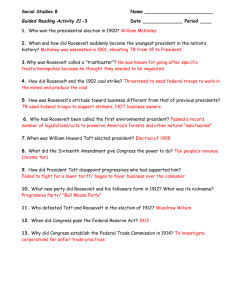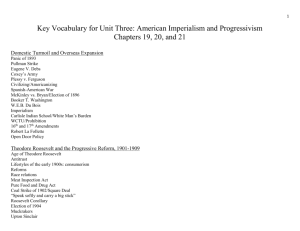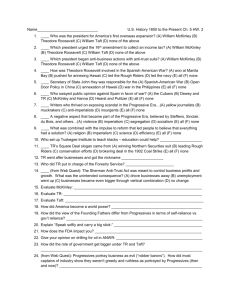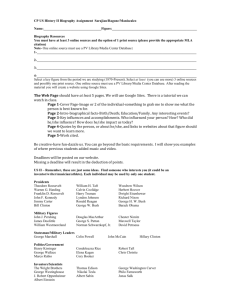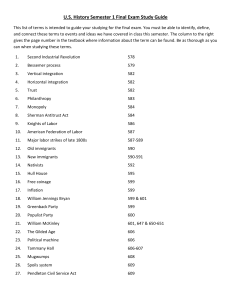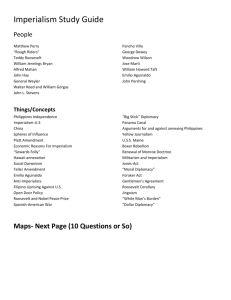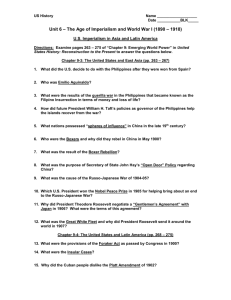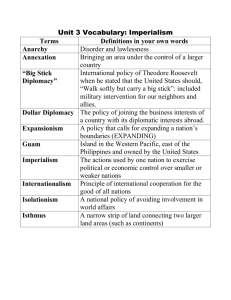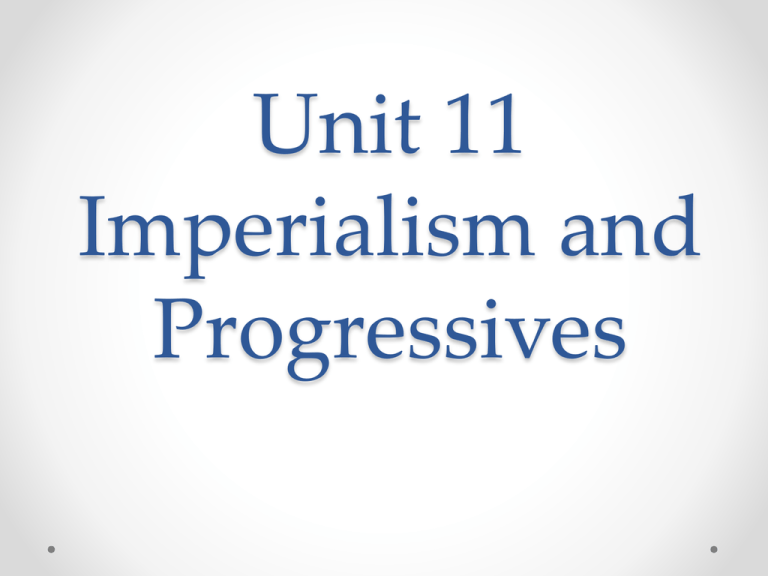
Unit 11
Imperialism and
Progressives
QUIZ
• 1. The Platt Amendment was added to which
country’s constitution?
• 2. The Open Door Notes were written to help
facilitate trade with which country?
• 3. WEB DuBois and a group of his supporters
founded this group to help promote the African
American civil rights (Acronym is ok…)
• 4. Which amendment outlawed alcohol sales?
© 2011, The McGraw-Hill
Companies, Inc. All Rights Reserved.
3
506-511 Quiz
• 1. This person led a cavalry charge up San Juan Hill,
and later claimed it was the best day of his life.
• 2. This is the nickname of the cavalry unit in #1.
• 3. This present-day country sparked intense debate
in America over the moral consequences of
annexation.
• 4. This person was President throughout America’s
imperial expansion.
© 2011, The McGraw-Hill
Companies, Inc. All Rights Reserved.
4
Politics of Equilibrium
The Party System
Stability and Stalemate
Little changed in the Rep. and Dem. Parties
High Turnout
78% of eligible voters turned out 1860-1900
Who voted Democrat? Why?
Republican? Why?
6
Politics of Equilibrium
Nat. Govt. Didn’t do much
Collected taxes, foreign policy, mail, military, civil war pension
Presidents and Patronage
Rutherford B. Hayes
Stalwarts and Half-Breeds
Election of 1880
Garfield wins
July 2, 1881 – Garfield assassinated
Chester A. Arthur is president
Pendleton Act
What did the Pendleton Act do?
7
The Politics of Equilibrium
– Cleveland, Harrison, and the Tariff
1884
Grover Cleveland Elected
Tough on crime, corruption and
politics
1888
Harrison defeats Cleveland
What was unique about this
election?
1892
Cleveland defeats Harrison….
Grover Cleveland
(Library of Congress)
8
New Public Issues
Public opinion was forcing Harrison to act
Sherman Antitrust Act
Tried to limit corporations. Not very successful.
McKinley Tariff
Why were people angry about this?
Interstate Commerce Act
Made all RR rates “reasonable and just”
9
Populism
Farmers ally themselves against the Railroads
Why?
July 1892 – People’s Party (Populism) created
Immediately gained seats in govt. but their potential was limited.
Populist Ideas
Ocala Demands
Allow farmers to borrow money with low interest
Abolition of National Banks
Direct election of Senators
Govt. ownership of RRs, telephones, and telegraphs
F
10
Crisis of the 1890s
– The Panic of 1893
America’s Interconnected Economy
Railroads, banks, loan dependent businesses….
Within 8 months 8,000 businesses, 156 RRs,
and 400 banks failed.
“Coxey’s Army”
What is Coxey’s Army?
– The Silver Question
“Bimetallism”
“Crime of 73”
What was the crime of 73? How does this affect farmers?
11
“A Cross of Gold”
William McKinley elected as the Republican
candidate
“A Cross of Gold”
Having behind us the commercial interests and the
laboring interests and all the toiling masses, we
shall answer their demands for a gold standard by
saying to them, you shall not press down upon the
brow of labor this crown of thorns. You shall not
crucify mankind upon a cross of gold.
Bryan nominated for the Democrats
William McKinley
(Library of Congress)
Why are the populists annoyed?
“Fusion”
What is Fusion? Why did the
Populists agree to it?
NBC Learn:
“Free Silver”
Conservative Victory
Birth of modern campaigning
Bryan traveled 18,000 miles and
addressed an estimated 5 million
people!
End of the People’s Party
They gambled on Bryan and lost…
Gold Standard Act
Confirmed the nation’s commitment to
the gold standard
More gold was discovered and the
amount of gold in the economy was
almost tripled, this alleviated concerns
for bimetallism.
Election of 1896
13
Stirrings of Imperialism
The “end of Manifest Destiny” caused
some to look abroad
Provided new markets
Americans felt it natural to exert
control over other weaker nations
Alfred Thayer Mahan
Influence of Sea Power Upon
History
Most powerful countries are strong
in the sea
14
Screen clipping taken: 3/2/2011, 11:01 AM
First Conquest…Hawaii
• 1790: Americans first arrive in Hawaii,
eventually become very connected to
Hawaiian trade
• 1891: Queen Lilioukalani of Hawaii proposes
removing rights of non-native Hawaiians…why?
• 1893: Americans lead a revolution and take control
• Why was it in Hawaii’s best interest to
become a state?
• American businessman Sanford Dole becomes
President
• 1898: Congress annexes Hawaii
© 2011, The McGraw-Hill Companies,
Inc. All Rights Reserved.
17
Identify the Causes of
Imperialism
Imperialism
Identify the Causes of
Imperialism
Competition/
Darwinism
Media
Industrialism
Navy
Imperialism
American
attitude
War with Spain
1895 – Cuban Revolt
More attention it paid to it now….why?
Dupuy de Lôme Letter
Spanish minister in Washington has letter intercepted…
What did his letter say?
YELLOW
JOURNALISM!
The Maine
Blows up in Havana Harbor, killing 260
Why was this so important?
“You furnish the pictures…and I’ll furnish the war”
William Randolph Hearst
20
War With Spain
“A Splendid Little War”
“Mopping up duties”
Only 460 Americans died in battle
Much of the Span. Forces had been
weakened by the Cuban revolts
Jose Marti
Cuban revolutionary in NY
Why is he important?
Supply and Mobilization Problems
What were some of the issues?
Seizing the Philippines
Dewey Victorious
Spanish doesn’t put up a fight….
21
Spanish-American War
Explain the connection
De Lome
letter
Maine
Cuban
Revolt
SpanishAmerican
War
1898
Yellow
Journalism
War With Spain
The Battle for Cuba
The Rough Riders
Led by Teddy Roosevelt
Charge up Kettle Hill!
“the great day of my life”
Puerto Rico Occupied
Theodore Roosevelt
War is ended……
and the Rough Riders
(Library of Congress)
Spain recognizes independence of Cuba
U.S. gains Puerto Rico and Guam
U.S. Continues occupation of Philippines
23
War With Spain
War with Spain
– Puerto Rico and the United States
Foraker Act
Ended military rule, established a civilian govt.
P.R. becomes a territory in 1917
24
The Debate Over the Philippines
The Philippines Question
What to do with the Philippines?
Reasons the U.S. took it over:
1.Returning it to Spain would be cowardly and dishonorable
2. Can’t let any other powers take it
3. They can’t rule themselves
Anti-Imperialist League
What are some reasons why people were opposed to Imperialism?
Supporters of Annexation
Invigorate the nation
Business opportunity
We already possessed it!
Election of 1900:
McKinley defeats
Bryan again
25
The Republic As Empire
Governing the Colonies
America helped Cuba move towards independence, but
Cuba didn’t mention the U.S.A. in their constitution!
Platt Amendment…
Cuba couldn’t make treaties
Allowed for American intervention to preserve life, liberty,
independence
27
The Philippine War
Why would some Filipinos think
Americans were hypocrites?
Emilio Aguinaldo
The Philippines Brutally
Subjugated
Led rebellions against American
occupation
Murders, executions, concentration
camps
The Philippines eventually
gained their independence
in 1946
Gradual Shift to Self-Rule
Aguinaldo gave up
USA built schools, road,
hospitals, bridges etc…
28
The Open Door Policy
Hay’s Open Door Notes
What did these notes say?
Boxer Rebellion
Group of Chinese martial artists,
rebelled against occupation
Why did America want to help
put down the rebellion?
A Modern Military System
America Retooled their military
system
“Asking only the open door for
ourselves, we are ready to accord the
open door to others.” - McKinley
29
Chapter Nineteen:
From Crisis to Empire
The American South Pacific Empire, 1900
© 2011, The McGraw-Hill Companies,
Inc. All Rights Reserved.
30
31
Chapter Twenty:
The Progressives
PROGRESSIVISM
Progressives believed in progress but thought that
direct intervention was necessary
Did NOT believe in Laissez faire or Social Darwinism
Believed in social cohesion and antimonopoly
Muckrakers and Social Gospel
Tried to expose scandal, corruption and injustice
By the new century, they focused mostly on “machine
governments” and “boss rule” in cities
Social Gospel was using faith to make social reform
Chiefly concerned with redeeming the nation’s cities.
34
35
WOMAN SUFFRAGE
“Natural Rights” Women deserves the
same rights as men, that
includes the right to
vote!
“The arbiter of her own
destiny…if we are to
consider her as a citizen,
as a member of a great
nation, she must have
the same rights as all
other members.”
Challenged “female
sphere”
National American
Woman Suffrage
Association (NAWSA) – 2
million members in 1917
help the temperance movement
End war??
Nineteenth Amendment
Passed in 1920, gave women
the right to vote
Equal Rights Amendment
37
ELECTION
DAY
Election Day
Critics of the womansuffrage movement,
including this
cartoonist, believed that
women's place was in
the home, not in the
public sphere. (Library
of Congress)
ASSAULT ON THE PARTIES
Before
Progressives could
reform society,
they needed to
reform
government
Initiative
Referendum
Direct Primary
Recall
Robert La Follette
Secret Ballot
Muckrakers
City-manager plan
Believed that the
state legislatures
were corrupted
From Wisc.
Regulated RRs,
utilities, regulate the
workplace, and provide
compensation for
injured laborers.
41
SOURCES OF PROGRESSIVE REFORM
Labor, the Machine and Reform
California passed a child labor law and limited
working hours
Some political machines began to use their
power for reform
1911- Triangle Shirtwaist Fire
Killed 146 workers
Began to research issues with work conditions
NY passed labor laws that imposed strict
regulations on factory owners and
established mechanisms for enforcement
Triangle Shirtwaist Fire
(Library of Congress)
42
AFRICAN AMERICANS AND REFORM
Booker T. Washington vs.
W.E.B. Du Bois
National Association for the
Advancement of Colored People
(NAACP)
“Is it possible and probable that nine millions
of men can make effective progress in economic lines
if they are deprived of political rights, made a
servile caste, and allowed only the most meager
chance for developing their exceptional men?”
W. E. B. Du Bois
44
THE TEMPERANCE CRUSADE
Violence, crime, drunkenness were on the
rise
Women pushed for temperance
Women’s Christian Temperance
Union (WCTU) had 245,000
members in 1911
1920 – 18th Amendment passed
production, distribution or sale of alcohol
is prohibited!
45
46
SOCIALISM
Eugene V. Debs
Received 1 million votes in 1912
Structural changes to the economy
Industrial Workers of the World (IWW) – “Wobblies”
Refused to support World War I
Constant harassment and persecution
48
THEODORE ROOSEVELT AND
THE MODERN PRESIDENCY
Took over when McKinley was assassinated
Champion of moderate change
Vision of Federal Power
1902 - forced the Sherman Antitrust Act against
the Northern Securities Company
Filed more than 40 antitrust suits as
President!
1902 – United Mine Workers Strike
10% pay raise, nine-hour day
49
THE “SQUARE DEAL”
Changing Ideas of Power
Hepburn Act
Gave Congress power to regulate RRs
Pure Food and Drug Act
Could not sell dangerous or ineffective
medicine
Meat Inspection Act
In response to reading Upton Sinclair’s The
Jungle
Advertising The Jungle
(Library of Congress)
50
ROOSEVELT AND THE ENVIRONMENT
Restricted development on millions of acres of
govt. land
First President to take an interest in
conservation
Added to the National Parks System
Panic and Retirement
Theodore Roosevelt and
1907 – Panic and recession hurt his popularity John Muir in Yosemite
(Library of Congress)
Retired after two terms…..temporarily
51
Establishment of National Parks and Forests
52
TAFT’S PRESIDENCY
“Never felt like the President”
Busted 90 trusts but never got the credit he
deserved
Payne-Aldrich Tariff
Signed into law by Taft
Didn’t really lower tariffs like
Progressives wanted to
Why were Progressives in favor of
lowering tariffs?
Public Land problems – Taft ended up
selling many western lands to big business
angering conservationists
REPUBLICAN PARTY SPLITS
Conservative Republicans and Progressive
Republicans split
Speaker of House Joseph Cannon often
ignored Progressive bills
He was supported by Taft
Election of 1910 - the Democrats regain Congress in
1910 for first time in 16 years
Roosevelt begins to campaign with “New
Nationalism”
BULL MOOSE PARTY
Angry at Taft’s lack of success, Roosevelt ran for
President again
Chaos at the Republican Convention
Created the Progressive Party which came to be
known as the Bull Moose Party.
People boasted Teddy was strong as a “bull
moose”
Were in favor of Progressive reforms
Initiative, referendum, women’s suffrage,
minimum wage etc.
Democrats selected Woodrow Wilson to
represent them.
ELECTION OF 1912
“New Nationalism” vs. “New Freedom
Wilson was a progressive Democrat
Taft and Roosevelt split the
Republican vote!
HOW THEY WERE DIFFERENT:
Taft – lenient on Big Business
Roosevelt – govt. action to support
big business, but didn’t oppose all of
them
Wilson – small business and free market competition, ALL big business
= EVIL. Not as socially progressive.
Debs – end to capitalism
Election of 1912
56
© 2011, The McGraw-Hill Companies, Inc. All
Rights Reserved.
57
WILSON’S PRESIDENCY
Lowering Tariffs
Federal Trade Act (business)
Underwood-Simmons Tariff
Income tax (16th Amendment) 1-6%
Could let businesses know if their actions
were allowable
Prosecute “unfair trade practices”
Federal Reserve Act (banks)
Kept reserves of money all over U.S.
Allowed for credit to be supported by U.S.
govt.
Child Labor Laws
Woodrow Wilson
(Library of Congress)
58

